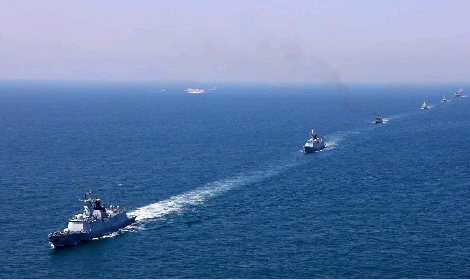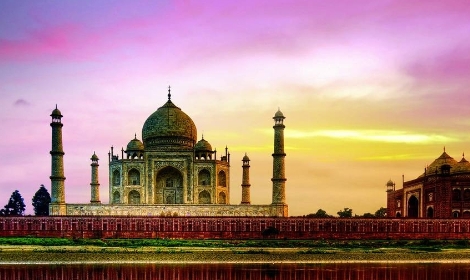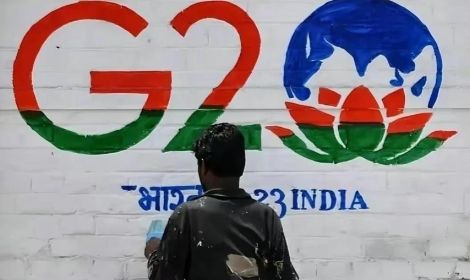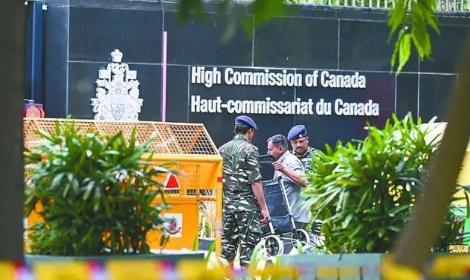印度作为一个国家的真正实力是什么(二)
正文翻译
What is the true strength of India as a country?
印度作为一个国家的真正实力是什么?
印度作为一个国家的真正实力是什么?
评论翻译
Sudhir Kumar Behera
Is secularism India's greatest strength?
No, In India secularism means appeasement.
As per survey 75% muslims are still living below the poverty line. Still some secular politician are claiming that they are the best sympathizers of Muslims.
Secularism word should be thrown out from the politics and from the constitution. Neither Politicians are doing secularism nor they are doing development.
世俗主义是印度最大的优势吗?
不,在印度,世俗主义意味着绥靖主义。
根据调查,75%的穆斯林仍然生活在贫困线以下。尽管如此,一些世俗政客仍声称他们是最为同情穆斯林的人。
应该把世俗主义从政治和宪法中剔除。政客们既不搞世俗主义,也不搞发展。
Sunil Vishwakarma
Is India the most powerful country?
I think INDIA is. We have one of the strongest army. We are largest democratic country along with that we have strongest man power when it comes to IT field.
We all have heard that next war is going to be a cyber war (some of you might be thinking it's gonna be a nuclear war so for your information we are also well versed in nuclear power). When it comes to IT field, we can see the domination of Indians. Take silicon valley for ex. More than 50% of engineers/employees in silicon valley are from India. And you all have heard about Google CEO, Microsoft CEO,MasterCard CEO, pepsi CEO and there are so many.
The factor that makes a country powerful is directly proportional to no. Of youngster in that country. And when it comes to India we have largest youngsters base in the world. Where most are well educated and experienced. We can take any field and see the domination of Indian like doctorate, engineer, law etc. We have talented as well as confident youngsters base that can transform the world with very ease. All we need is guidances and opportunities.
Along with that what makes a country powerful is education system. Now you all might be thinking when it comes to education USA UK and Australia are on the top. Yes they are but we also have IIM/IIT known for producing highly skilled engineer and management professionals. We can see companies like Facebook , Microsoft, Google coming to IIT / IIM. And don't forget USA is having highest visa applications from India.
Indians are known because of their creativity and this creative people make our country powerful and strongest one.
Proud to be an Indian.
印度是最强大的国家吗?
我认为印度是。我们有一支最强大的军队。我们是最大的民主国家,同时在IT领域,我们拥有实力最强的人力资源。
我们都听说下一场战争将是一场网络战争(你们中的一些人可能认为下一场战争将是一次核战争,供你参考,我们也精通核动力)。说到IT领域,我们可以看到印度人的统治地位。以硅谷为例。硅谷50%以上的工程师/员工来自印度。你们都听说过谷歌的CEO,微软的CEO,万事达卡的CEO,百事可乐的CEO等等都是印度人吧。
一个国家强大的因素与该国年轻人的数量成正比。说到印度,我们拥有世界上最大规模的年轻人基数。大多数人都受过良好的教育,经验丰富。我们可以进入任何领域,看看印度人在博士、工程师、法律等方面的统治地位。我们的年轻人才华横溢且自信,他们可以轻而易举地改变世界。我们所需要的只是指导和机会。
除此之外,使一个国家强大的因素是教育系统。现在你们可能都在想,在教育方面,美国、英国和澳大利亚名列前茅。是的,但我们也有印度管理学院/印度理工学院,以培养高技能的工程师和管理专业人员而闻名。我们可以看到像Facebook、微软、谷歌这样的公司来印度理工学院/印度管理学院(招募人才)。别忘了,美国收到的印度签证申请是最多的。
印度人以他们的创造力而闻名,这些富有创造力的人使我们的国家变得强大和有影响力。
为自己是印度人而自豪。
The anonymously writes ·
India has several strengths as a country, including:
Demographic dividend: India has a young and growing population, which can serve as a source of strength in terms of a large and productive workforce.
Economic potential: India is the world's fifth-largest economy and has a large and growing middle class, which provides significant economic potential and consumer market opportunities.
Cultural diversity: India is a land of diverse cultures, religions, and languages. This cultural diversity has helped India build a strong national identity and contributes to its strength as a nation.
Strategic location: India is situated in a strategically important location, with easy access to major global markets, including Asia, the Middle East, and Europe.
Technological innovation: India has a rapidly growing technology sector, with a focus on innovation and entrepreneurship, which provides opportunities for growth and development.
Political stability: India is a stable democracy with a well-established legal system and a free press, which provides a conducive environment for growth and development.
Overall, India's true strength lies in its ability to leverage these strengths to promote economic and social development, to build strong diplomatic relationships with other countries, and to provide a secure and prosperous future for its people. India's importantance on a global stage has grown significantly in the past decade. India is the fastest growing nation in Asia with a considerably youth population.
印度作为一个国家有几个优势,包括:
人口红利:印度拥有年轻且不断增长的人口,就庞大而富有成效的劳动力而言,这可以成为实力的源泉。
经济潜力:印度是世界第五大经济体,拥有庞大且不断增长的中产阶级,这提供了巨大的经济潜力和消费市场机会。
文化多样性:印度是一个拥有多种文化、宗教和语言的国家。这种文化多样性帮助印度建立了强大的民族认同,对国家而言,有助于提升实力。
战略位置:印度位于一个重要的战略位置,很容易进入主要的全球市场,包括亚洲、中东和欧洲。
技术创新:印度的科技行业发展迅速,注重创新和创业,为增长和发展提供了机会。
政治稳定:印度是一个稳定的民主国家,拥有完善的法律制度和新闻自由,为增长和发展提供了有利的环境。
总的来说,印度的真正优势在于它有能力利用这些优势促进经济和社会发展,与其他国家建立牢固的外交关系,并为其人民提供一个安全和繁荣的未来。在过去的十年里,印度在全球舞台上的重要性显著提高。印度是亚洲增长最快的国家,年轻人口众多。
Rays Solas
When did you find out that India has become strong?
In an interview with Middle East country media in October 2021, Pakistani PM Imran Khan cried a lot on various topics related to India. His cry baby public image made me realize that India has become strong.
1. He admitted that India carried airstrikes (27 February 2019 Balakot incident) in his country for the first time since 1971. During the Kargil border war, Vajpayee government decided not to breach international boundary called LOC (Line of Control). Modi had the courage to do so despite the fact that both countries are nuclear and things can become too nasty to control. To control the fallout of airstrikes, Modi’s friend US President Donald Trump made the announcement just before the air strikes that India may do something big. This scared Imran Khan.
2. India-Israel cooperation made him cry which never happened before Modi. Imran was spooked by India's assertiveness which he thinks Modi learned from Israel. He said, "India now operates like Israel. Prime Minister Narendra Modi visits Israel and comes back and clamps down on Kashmir, the events of August 5th, 2019. Do we think he got his instructions from Israel? That's what Israel has done. They have such a strong security apparatus, and they just crush anything. They will send people, kill and assassinate. They have full confidence in the veto power of the US in the UN Security Council. So, they get away with anything. And because India feels that they are now seen as a bulwark against China and are now part of the Quad, I feel India can get away with anything".
3. Imran Khan cried on abrogation of Article 370 of the Indian constitution which is an internal matter of India. No countries except China made any issue of this article and bifurcation of the J&K state into two UT. He accused India of trying to change the demography of Kashmir, accusing New Delhi of trying to bringing settlers from outside and trying to convert the Muslim majority to a minority there. But he forgot to mention the past when Pakistan paid separatist Hurriyat leaders and terrorist organisations used brute force, massacre etc. to kick out Hindu minority from the state. Imran Khan also halted trading with India after the abrogation of Article 370 which harmed Pakistani economy badly.
你什么时候发现印度变得强大了?
在2021年10月接受中东国家媒体采访时,巴基斯坦总理伊姆兰·汗在与印度有关的各种话题上哭了很多。他爱哭的公众形象让我意识到印度已经变得强大了。
1、他承认,印度自1971年以来首次在他的国家进行了空袭(2019年2月27日巴拉科特事件)。在卡吉尔边界战争期间,瓦杰帕伊政府决定不突破被称为“控制线”的国际边界。尽管两国都有核武器,而且情况可能会因太糟而变得难以控制,但莫迪还是有勇气这么做。为了控制空袭的影响,莫迪的朋友美国总统唐纳德·特朗普在空袭前宣布,印度可能会做一些大事。这吓坏了伊姆兰·汗。
2、印度和以色列的合作让他哭了,这在莫迪之前是从未发生过的。伊姆兰被印度的自信吓了一跳,他认为莫迪是有向以色列学习过的。他说:“印度现在像以色列一样运作。总理纳伦德拉·莫迪访问以色列,回来后就镇压克什米尔,即2019年8月5日的事件。”。我们可以认为这是他是从以色列那里学到的策略吗?以色列就是这么干的。他们有一个强大的安全机构,他们可以粉碎任何东西。他们会派人去杀人和暗杀。他们对美国在联合国安理会的否决权充满信心。所以,他们可以逃脱任何惩罚。因为印度觉得他们现在被视为对抗中国的堡垒,现在是四国集团(Quad)的成员,我觉得印度可以逃脱任何惩罚。”
3、伊姆兰·汗呼吁废除印度宪法第370条,这可是印度的内部事务。除了中国,没有其他国家对这篇文章和印控克什米尔分裂成两个邦提出任何问题。他指责印度试图改变克什米尔的人口结构,指责新德里试图从外部引进定居者,并试图将穆斯林占多数的人转变为那里的少数人。但他忘了提及巴基斯坦过去曾付钱给分离主义者Hurriyat(,印控克什米尔一分离组织名称)领导人,恐怖组织使用暴力、屠杀等手段将印度教少数民族驱逐出该邦。伊姆兰·汗在废除了严重损害巴基斯坦经济的第370条后,也停止了与印度的贸易。
Rakesh Ramakrishnan
Is India turning into a capitalist economy?
Kinda yes.
I'll explain how (Following answer is my own experience).
I live in Pune. I wanted to go to railway station from airport. So I asked a Rickshawala, he directly said 200rs(which is double of fare). WHAT!!
I tried to negotiate with him and asked him to go according to Meter. He refused by giving lame excuses like return fare, no change available etc. He realised I was in a hurry and I had a luguage, I was totally pissed off. But unwillingly accepted and went with him.
I am pretty sure many Punekars have had similar experiences with them. So have many tourists. Here is where capitalism is so important for India.
Now cabs services like OLA,UBER,MERU etc come into picture. All private can companies provide door to door pickup and drop services on similar fare as Rickshaws.We can book prepaid cabs, travel in AC, pay through app (and even get cashback sometimes). We can even share a cab with others more convenient and less fare. If service is bad you can even register a complaint and get refund. Much easier, isn't it?
印度正在转向资本主义经济吗?
是的。
我将解释如何转变的(以下答案来自我自己的经验)。
我住在浦那,我想从机场去火车站。所以我问了一个人力车车夫,他直接说200卢比(是车费的两倍),见鬼!
我试着和他谈判,让他打表,他拒绝打表的要求,给出了一些蹩脚的借口,比如回程要放空、没有零钱等。他意识到我很赶时间,而且我有一袋行李包,我当时很生气,但还是很不情愿地接受他的要求并坐上了他的车。
我敢肯定,许多浦那人都有过类似的经历,许多游客也遭遇过。这就是说印度存在资本主义的一个重要原因。
现在,像OLA、UBER、MERU等出租车服务开始出现。所有私人出租车公司都提供上门接送服务,费用与人力车的车费相当。我们可以预订出租车并预付费、享受开空调服务、通过应用程序支付(有时甚至可以获得现金返还)。我们甚至可以更方便、更便宜地与他人共享出租车。如果服务不好,你甚至可以投诉并获得退款;便捷多了,不是吗?
So more and more people prefer capitalistic private can companies than unx driven Rickshawalas.
Who is responsible for this? Bad attitude and behaviour of Rickshawalas have pushed their customers towards capitalistic cab companies. They are responsible for their own demise, can't blame others. unxs call for Strike/Bandh every now and then, which angers the daily commuters. So they choose a different option.
Capitalist companies also have to show their profits and accounts to the govt. So 90% of money is white. They also pay corporate taxes,which helps the govt revenues and also get funding from abroad increasing the FDI of the country. And also provide social security for their drivers.
Similarly, many capitalistic companies have taken advantage of bad services, policies and practices by socialist/unxs and provided people what they want.
People will keep on leaning towards capitalism untill and unless the socialist/unxs provide better service to their customers.
This is my personal opinion, you are free to agree/disagree. India's service sector contributes to 60% of economy. And people are preferring private companies to improve their lives at very faster rate.
So the answer to your question is YES.
因此,越来越多的人更喜欢资本主义的私营出租车公司,而不是工会驱动的人力车。
谁对此负责?人力车的恶劣态度和行为将他们的客户推向了资本主义出租车公司。他们要为自己的灭亡负责,不能责怪别人。工会不时呼吁罢工,这激怒了日常通勤者。所以他们选择了不同的出行方案。
资本主义体制下的公司还必须向政府展示他们的利润和账目。所以90%的钱都是完全公正的。他们还缴纳公司税,这有助于政府收入,还可以从国外获得资金,增加该国的外国直接投资。并为司机提供社会保障。
同样,许多资本主义公司利用社会主义工会的不良服务、政策和做法,为人们提供他们想要的东西。
除非社会主义者/工会为他们的顾客提供更好的服务,否则人们将继续倾向于资本主义。
这是我个人的看法,你可以赞同,也可以不赞同哈。印度的服务业占经济的60%。人们更喜欢私营公司,可以更快的速度改善他们的生活。
所以对于你的问题,答案是“肯定的”。
Ajay Poswal
What are strengths and weaknesses of Indian people?
Strengths:
1. We can find solution to almost any situation. The solution might not be a perfect one but still it's a solution. It is also referred as 'Jugaad' sometimes.
2. We can easily accommodate into any climate/culture/region.
3. Most of the Indians know more than one language.
4. With Billion+ people, 20+ official languages, 700+ dialects and around 10 religion we are standing united as a democracy.
5. Our family system which has produced least step dads/step moms or single dads/single moms in the world.
Weaknesses:
1. We do a lot of politics on religion/caste/minority etc.
2. We have highest ego per unit of achievement.
3. We boast about our past without discussing the shortcomings of present.
4. Skin colour matters a lot to us though we accuse others of being racist.
We have a lot of strengths as well as weaknesses but what matters most is our country is on an upward growth in every aspect and we are dealing better with our weaknesses and utilizing our strengths.
印度人的优势和劣势是什么?
优势:
1.我们几乎可以找到解决任何情况的办法。这个解决方案可能不是完美的,但它仍然是一个解决方案。它有时也被称为“(解决问题的)机敏方法”。
2.我们可以很容易地适应任何气候/文化/地区。
3.大多数印度人懂得不止一种语言。
4.我们有十亿以上的人口,20多种官方语言,700多种方言和大约10种宗教,作为一个民主国家,我们团结一致。
5.我们的家庭制度产生了世界上最少的继父/继母或单身父亲/单身母亲。
劣势:
1.我们在宗教、种姓、少数民族等问题上掺杂了很多政治因素。
2.我们每取得丁点成就,就容易自满。
3.我们吹嘘自己的过去,却不讨论现在的不足。
4.肤色是我们很在意的方面,然而我们却指责别人是种族主义者。
我们有很多优势和劣势,但最重要的是,我们的国家在各个方面都在向上发展,我们正在更好地处理我们的劣势、利用我们的优势。
The anonymously writes
India is a country with diverse strengths that contribute to its overall development and progress. Some of the key strengths of India include:
Human capital: India is home to a large and diverse population of more than 1.3 billion people, with a significant percentage of its population under the age of 35. This young and dynamic demographic offers a significant pool of skilled and unskilled labor that can help drive the country's economic growth.
Economic potential: India is the world's sixth-largest economy in terms of nominal GDP and is projected to become the third-largest economy by 2030. It has a large consumer market, a diverse range of industries, and a rapidly growing middle class, which presents significant opportunities for businesses and investors.
Cultural heritage: India has a rich cultural heritage and diverse history, with a myriad of languages, religions, and customs. Its cultural heritage has contributed to the country's soft power and global influence, as well as its booming tourism industry.
Political stability: Despite being a diverse and complex country, India has maintained political stability and a robust democratic system for more than seven decades. This stability has contributed to the country's economic growth, social development, and international standing.
Technological advancements: India has made significant strides in the field of technology, particularly in the areas of IT, biotech, and space exploration. Its vibrant start-up ecosystem, skilled workforce, and supportive government policies have helped to drive technological innovation and entrepreneurship in the country.
Overall, India's strengths lie in its diverse population, economic potential, cultural heritage, political stability, and technological advancements. These factors offer a strong foundation for the country's continued growth and development.
印度是一个拥有多种优势的国家,有助于其整体发展和进步。印度的一些主要优势包括:
人力资本:印度人口众多,多样化,人口数量超过13亿,35岁以下人口占很大比例。这一年轻而充满活力的人口提供了大量的技术和非技术劳动力,有助于推动国家的经济增长。
经济潜力:按名义GDP计算,印度是世界第六大经济体,预计到2030年将成为第三大经济体。它拥有庞大的消费市场、多样化的行业和快速增长的中产阶级,这为企业和投资者提供了重要的机会。
文化遗产:印度拥有丰富的文化遗产和多样的历史,有着无数的语言、宗教和习俗。其文化遗产为该国的软实力和全球影响力以及蓬勃发展的旅游业做出了贡献。
政治稳定:尽管印度是一个多样化和复杂的国家,但70多年来一直保持着政治稳定和强大的民主制度。这种稳定有助于该国的经济增长、社会发展和国际地位。
技术进步:印度在科技领域取得了重大进展,特别是在信息技术、生物技术和太空探索领域。其充满活力的创业生态系统、熟练的劳动力和支持性的政府政策有助于推动该国的技术创新和创业。
总的来说,印度的优势在于其多样化的人口、经济潜力、文化遗产、政治稳定和技术进步。这些因素为该国的持续增长和发展奠定了坚实的基础。
Is secularism India's greatest strength?
No, In India secularism means appeasement.
As per survey 75% muslims are still living below the poverty line. Still some secular politician are claiming that they are the best sympathizers of Muslims.
Secularism word should be thrown out from the politics and from the constitution. Neither Politicians are doing secularism nor they are doing development.
世俗主义是印度最大的优势吗?
不,在印度,世俗主义意味着绥靖主义。
根据调查,75%的穆斯林仍然生活在贫困线以下。尽管如此,一些世俗政客仍声称他们是最为同情穆斯林的人。
应该把世俗主义从政治和宪法中剔除。政客们既不搞世俗主义,也不搞发展。
Sunil Vishwakarma
Is India the most powerful country?
I think INDIA is. We have one of the strongest army. We are largest democratic country along with that we have strongest man power when it comes to IT field.
We all have heard that next war is going to be a cyber war (some of you might be thinking it's gonna be a nuclear war so for your information we are also well versed in nuclear power). When it comes to IT field, we can see the domination of Indians. Take silicon valley for ex. More than 50% of engineers/employees in silicon valley are from India. And you all have heard about Google CEO, Microsoft CEO,MasterCard CEO, pepsi CEO and there are so many.
The factor that makes a country powerful is directly proportional to no. Of youngster in that country. And when it comes to India we have largest youngsters base in the world. Where most are well educated and experienced. We can take any field and see the domination of Indian like doctorate, engineer, law etc. We have talented as well as confident youngsters base that can transform the world with very ease. All we need is guidances and opportunities.
Along with that what makes a country powerful is education system. Now you all might be thinking when it comes to education USA UK and Australia are on the top. Yes they are but we also have IIM/IIT known for producing highly skilled engineer and management professionals. We can see companies like Facebook , Microsoft, Google coming to IIT / IIM. And don't forget USA is having highest visa applications from India.
Indians are known because of their creativity and this creative people make our country powerful and strongest one.
Proud to be an Indian.
印度是最强大的国家吗?
我认为印度是。我们有一支最强大的军队。我们是最大的民主国家,同时在IT领域,我们拥有实力最强的人力资源。
我们都听说下一场战争将是一场网络战争(你们中的一些人可能认为下一场战争将是一次核战争,供你参考,我们也精通核动力)。说到IT领域,我们可以看到印度人的统治地位。以硅谷为例。硅谷50%以上的工程师/员工来自印度。你们都听说过谷歌的CEO,微软的CEO,万事达卡的CEO,百事可乐的CEO等等都是印度人吧。
一个国家强大的因素与该国年轻人的数量成正比。说到印度,我们拥有世界上最大规模的年轻人基数。大多数人都受过良好的教育,经验丰富。我们可以进入任何领域,看看印度人在博士、工程师、法律等方面的统治地位。我们的年轻人才华横溢且自信,他们可以轻而易举地改变世界。我们所需要的只是指导和机会。
除此之外,使一个国家强大的因素是教育系统。现在你们可能都在想,在教育方面,美国、英国和澳大利亚名列前茅。是的,但我们也有印度管理学院/印度理工学院,以培养高技能的工程师和管理专业人员而闻名。我们可以看到像Facebook、微软、谷歌这样的公司来印度理工学院/印度管理学院(招募人才)。别忘了,美国收到的印度签证申请是最多的。
印度人以他们的创造力而闻名,这些富有创造力的人使我们的国家变得强大和有影响力。
为自己是印度人而自豪。
The anonymously writes ·
India has several strengths as a country, including:
Demographic dividend: India has a young and growing population, which can serve as a source of strength in terms of a large and productive workforce.
Economic potential: India is the world's fifth-largest economy and has a large and growing middle class, which provides significant economic potential and consumer market opportunities.
Cultural diversity: India is a land of diverse cultures, religions, and languages. This cultural diversity has helped India build a strong national identity and contributes to its strength as a nation.
Strategic location: India is situated in a strategically important location, with easy access to major global markets, including Asia, the Middle East, and Europe.
Technological innovation: India has a rapidly growing technology sector, with a focus on innovation and entrepreneurship, which provides opportunities for growth and development.
Political stability: India is a stable democracy with a well-established legal system and a free press, which provides a conducive environment for growth and development.
Overall, India's true strength lies in its ability to leverage these strengths to promote economic and social development, to build strong diplomatic relationships with other countries, and to provide a secure and prosperous future for its people. India's importantance on a global stage has grown significantly in the past decade. India is the fastest growing nation in Asia with a considerably youth population.
印度作为一个国家有几个优势,包括:
人口红利:印度拥有年轻且不断增长的人口,就庞大而富有成效的劳动力而言,这可以成为实力的源泉。
经济潜力:印度是世界第五大经济体,拥有庞大且不断增长的中产阶级,这提供了巨大的经济潜力和消费市场机会。
文化多样性:印度是一个拥有多种文化、宗教和语言的国家。这种文化多样性帮助印度建立了强大的民族认同,对国家而言,有助于提升实力。
战略位置:印度位于一个重要的战略位置,很容易进入主要的全球市场,包括亚洲、中东和欧洲。
技术创新:印度的科技行业发展迅速,注重创新和创业,为增长和发展提供了机会。
政治稳定:印度是一个稳定的民主国家,拥有完善的法律制度和新闻自由,为增长和发展提供了有利的环境。
总的来说,印度的真正优势在于它有能力利用这些优势促进经济和社会发展,与其他国家建立牢固的外交关系,并为其人民提供一个安全和繁荣的未来。在过去的十年里,印度在全球舞台上的重要性显著提高。印度是亚洲增长最快的国家,年轻人口众多。
Rays Solas
When did you find out that India has become strong?
In an interview with Middle East country media in October 2021, Pakistani PM Imran Khan cried a lot on various topics related to India. His cry baby public image made me realize that India has become strong.
1. He admitted that India carried airstrikes (27 February 2019 Balakot incident) in his country for the first time since 1971. During the Kargil border war, Vajpayee government decided not to breach international boundary called LOC (Line of Control). Modi had the courage to do so despite the fact that both countries are nuclear and things can become too nasty to control. To control the fallout of airstrikes, Modi’s friend US President Donald Trump made the announcement just before the air strikes that India may do something big. This scared Imran Khan.
2. India-Israel cooperation made him cry which never happened before Modi. Imran was spooked by India's assertiveness which he thinks Modi learned from Israel. He said, "India now operates like Israel. Prime Minister Narendra Modi visits Israel and comes back and clamps down on Kashmir, the events of August 5th, 2019. Do we think he got his instructions from Israel? That's what Israel has done. They have such a strong security apparatus, and they just crush anything. They will send people, kill and assassinate. They have full confidence in the veto power of the US in the UN Security Council. So, they get away with anything. And because India feels that they are now seen as a bulwark against China and are now part of the Quad, I feel India can get away with anything".
3. Imran Khan cried on abrogation of Article 370 of the Indian constitution which is an internal matter of India. No countries except China made any issue of this article and bifurcation of the J&K state into two UT. He accused India of trying to change the demography of Kashmir, accusing New Delhi of trying to bringing settlers from outside and trying to convert the Muslim majority to a minority there. But he forgot to mention the past when Pakistan paid separatist Hurriyat leaders and terrorist organisations used brute force, massacre etc. to kick out Hindu minority from the state. Imran Khan also halted trading with India after the abrogation of Article 370 which harmed Pakistani economy badly.
你什么时候发现印度变得强大了?
在2021年10月接受中东国家媒体采访时,巴基斯坦总理伊姆兰·汗在与印度有关的各种话题上哭了很多。他爱哭的公众形象让我意识到印度已经变得强大了。
1、他承认,印度自1971年以来首次在他的国家进行了空袭(2019年2月27日巴拉科特事件)。在卡吉尔边界战争期间,瓦杰帕伊政府决定不突破被称为“控制线”的国际边界。尽管两国都有核武器,而且情况可能会因太糟而变得难以控制,但莫迪还是有勇气这么做。为了控制空袭的影响,莫迪的朋友美国总统唐纳德·特朗普在空袭前宣布,印度可能会做一些大事。这吓坏了伊姆兰·汗。
2、印度和以色列的合作让他哭了,这在莫迪之前是从未发生过的。伊姆兰被印度的自信吓了一跳,他认为莫迪是有向以色列学习过的。他说:“印度现在像以色列一样运作。总理纳伦德拉·莫迪访问以色列,回来后就镇压克什米尔,即2019年8月5日的事件。”。我们可以认为这是他是从以色列那里学到的策略吗?以色列就是这么干的。他们有一个强大的安全机构,他们可以粉碎任何东西。他们会派人去杀人和暗杀。他们对美国在联合国安理会的否决权充满信心。所以,他们可以逃脱任何惩罚。因为印度觉得他们现在被视为对抗中国的堡垒,现在是四国集团(Quad)的成员,我觉得印度可以逃脱任何惩罚。”
3、伊姆兰·汗呼吁废除印度宪法第370条,这可是印度的内部事务。除了中国,没有其他国家对这篇文章和印控克什米尔分裂成两个邦提出任何问题。他指责印度试图改变克什米尔的人口结构,指责新德里试图从外部引进定居者,并试图将穆斯林占多数的人转变为那里的少数人。但他忘了提及巴基斯坦过去曾付钱给分离主义者Hurriyat(,印控克什米尔一分离组织名称)领导人,恐怖组织使用暴力、屠杀等手段将印度教少数民族驱逐出该邦。伊姆兰·汗在废除了严重损害巴基斯坦经济的第370条后,也停止了与印度的贸易。
Rakesh Ramakrishnan
Is India turning into a capitalist economy?
Kinda yes.
I'll explain how (Following answer is my own experience).
I live in Pune. I wanted to go to railway station from airport. So I asked a Rickshawala, he directly said 200rs(which is double of fare). WHAT!!
I tried to negotiate with him and asked him to go according to Meter. He refused by giving lame excuses like return fare, no change available etc. He realised I was in a hurry and I had a luguage, I was totally pissed off. But unwillingly accepted and went with him.
I am pretty sure many Punekars have had similar experiences with them. So have many tourists. Here is where capitalism is so important for India.
Now cabs services like OLA,UBER,MERU etc come into picture. All private can companies provide door to door pickup and drop services on similar fare as Rickshaws.We can book prepaid cabs, travel in AC, pay through app (and even get cashback sometimes). We can even share a cab with others more convenient and less fare. If service is bad you can even register a complaint and get refund. Much easier, isn't it?
印度正在转向资本主义经济吗?
是的。
我将解释如何转变的(以下答案来自我自己的经验)。
我住在浦那,我想从机场去火车站。所以我问了一个人力车车夫,他直接说200卢比(是车费的两倍),见鬼!
我试着和他谈判,让他打表,他拒绝打表的要求,给出了一些蹩脚的借口,比如回程要放空、没有零钱等。他意识到我很赶时间,而且我有一袋行李包,我当时很生气,但还是很不情愿地接受他的要求并坐上了他的车。
我敢肯定,许多浦那人都有过类似的经历,许多游客也遭遇过。这就是说印度存在资本主义的一个重要原因。
现在,像OLA、UBER、MERU等出租车服务开始出现。所有私人出租车公司都提供上门接送服务,费用与人力车的车费相当。我们可以预订出租车并预付费、享受开空调服务、通过应用程序支付(有时甚至可以获得现金返还)。我们甚至可以更方便、更便宜地与他人共享出租车。如果服务不好,你甚至可以投诉并获得退款;便捷多了,不是吗?
So more and more people prefer capitalistic private can companies than unx driven Rickshawalas.
Who is responsible for this? Bad attitude and behaviour of Rickshawalas have pushed their customers towards capitalistic cab companies. They are responsible for their own demise, can't blame others. unxs call for Strike/Bandh every now and then, which angers the daily commuters. So they choose a different option.
Capitalist companies also have to show their profits and accounts to the govt. So 90% of money is white. They also pay corporate taxes,which helps the govt revenues and also get funding from abroad increasing the FDI of the country. And also provide social security for their drivers.
Similarly, many capitalistic companies have taken advantage of bad services, policies and practices by socialist/unxs and provided people what they want.
People will keep on leaning towards capitalism untill and unless the socialist/unxs provide better service to their customers.
This is my personal opinion, you are free to agree/disagree. India's service sector contributes to 60% of economy. And people are preferring private companies to improve their lives at very faster rate.
So the answer to your question is YES.
因此,越来越多的人更喜欢资本主义的私营出租车公司,而不是工会驱动的人力车。
谁对此负责?人力车的恶劣态度和行为将他们的客户推向了资本主义出租车公司。他们要为自己的灭亡负责,不能责怪别人。工会不时呼吁罢工,这激怒了日常通勤者。所以他们选择了不同的出行方案。
资本主义体制下的公司还必须向政府展示他们的利润和账目。所以90%的钱都是完全公正的。他们还缴纳公司税,这有助于政府收入,还可以从国外获得资金,增加该国的外国直接投资。并为司机提供社会保障。
同样,许多资本主义公司利用社会主义工会的不良服务、政策和做法,为人们提供他们想要的东西。
除非社会主义者/工会为他们的顾客提供更好的服务,否则人们将继续倾向于资本主义。
这是我个人的看法,你可以赞同,也可以不赞同哈。印度的服务业占经济的60%。人们更喜欢私营公司,可以更快的速度改善他们的生活。
所以对于你的问题,答案是“肯定的”。
Ajay Poswal
What are strengths and weaknesses of Indian people?
Strengths:
1. We can find solution to almost any situation. The solution might not be a perfect one but still it's a solution. It is also referred as 'Jugaad' sometimes.
2. We can easily accommodate into any climate/culture/region.
3. Most of the Indians know more than one language.
4. With Billion+ people, 20+ official languages, 700+ dialects and around 10 religion we are standing united as a democracy.
5. Our family system which has produced least step dads/step moms or single dads/single moms in the world.
Weaknesses:
1. We do a lot of politics on religion/caste/minority etc.
2. We have highest ego per unit of achievement.
3. We boast about our past without discussing the shortcomings of present.
4. Skin colour matters a lot to us though we accuse others of being racist.
We have a lot of strengths as well as weaknesses but what matters most is our country is on an upward growth in every aspect and we are dealing better with our weaknesses and utilizing our strengths.
印度人的优势和劣势是什么?
优势:
1.我们几乎可以找到解决任何情况的办法。这个解决方案可能不是完美的,但它仍然是一个解决方案。它有时也被称为“(解决问题的)机敏方法”。
2.我们可以很容易地适应任何气候/文化/地区。
3.大多数印度人懂得不止一种语言。
4.我们有十亿以上的人口,20多种官方语言,700多种方言和大约10种宗教,作为一个民主国家,我们团结一致。
5.我们的家庭制度产生了世界上最少的继父/继母或单身父亲/单身母亲。
劣势:
1.我们在宗教、种姓、少数民族等问题上掺杂了很多政治因素。
2.我们每取得丁点成就,就容易自满。
3.我们吹嘘自己的过去,却不讨论现在的不足。
4.肤色是我们很在意的方面,然而我们却指责别人是种族主义者。
我们有很多优势和劣势,但最重要的是,我们的国家在各个方面都在向上发展,我们正在更好地处理我们的劣势、利用我们的优势。
The anonymously writes
India is a country with diverse strengths that contribute to its overall development and progress. Some of the key strengths of India include:
Human capital: India is home to a large and diverse population of more than 1.3 billion people, with a significant percentage of its population under the age of 35. This young and dynamic demographic offers a significant pool of skilled and unskilled labor that can help drive the country's economic growth.
Economic potential: India is the world's sixth-largest economy in terms of nominal GDP and is projected to become the third-largest economy by 2030. It has a large consumer market, a diverse range of industries, and a rapidly growing middle class, which presents significant opportunities for businesses and investors.
Cultural heritage: India has a rich cultural heritage and diverse history, with a myriad of languages, religions, and customs. Its cultural heritage has contributed to the country's soft power and global influence, as well as its booming tourism industry.
Political stability: Despite being a diverse and complex country, India has maintained political stability and a robust democratic system for more than seven decades. This stability has contributed to the country's economic growth, social development, and international standing.
Technological advancements: India has made significant strides in the field of technology, particularly in the areas of IT, biotech, and space exploration. Its vibrant start-up ecosystem, skilled workforce, and supportive government policies have helped to drive technological innovation and entrepreneurship in the country.
Overall, India's strengths lie in its diverse population, economic potential, cultural heritage, political stability, and technological advancements. These factors offer a strong foundation for the country's continued growth and development.
印度是一个拥有多种优势的国家,有助于其整体发展和进步。印度的一些主要优势包括:
人力资本:印度人口众多,多样化,人口数量超过13亿,35岁以下人口占很大比例。这一年轻而充满活力的人口提供了大量的技术和非技术劳动力,有助于推动国家的经济增长。
经济潜力:按名义GDP计算,印度是世界第六大经济体,预计到2030年将成为第三大经济体。它拥有庞大的消费市场、多样化的行业和快速增长的中产阶级,这为企业和投资者提供了重要的机会。
文化遗产:印度拥有丰富的文化遗产和多样的历史,有着无数的语言、宗教和习俗。其文化遗产为该国的软实力和全球影响力以及蓬勃发展的旅游业做出了贡献。
政治稳定:尽管印度是一个多样化和复杂的国家,但70多年来一直保持着政治稳定和强大的民主制度。这种稳定有助于该国的经济增长、社会发展和国际地位。
技术进步:印度在科技领域取得了重大进展,特别是在信息技术、生物技术和太空探索领域。其充满活力的创业生态系统、熟练的劳动力和支持性的政府政策有助于推动该国的技术创新和创业。
总的来说,印度的优势在于其多样化的人口、经济潜力、文化遗产、政治稳定和技术进步。这些因素为该国的持续增长和发展奠定了坚实的基础。










